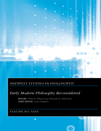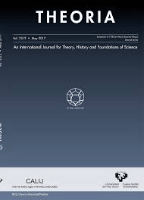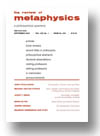
Epistemology & Philosophy of Science-Epistemologiya i Filosofiya Nauki
Scope & Guideline
Illuminating the Pathways of Philosophical Thought
Introduction
Aims and Scopes
- Philosophical Analysis of Scientific Methodologies:
The journal regularly explores various scientific methodologies, including discussions around verification, testability, and the role of thought experiments in scientific inquiry. - Historical Contextualization of Philosophical Ideas:
There is a strong emphasis on the historical development of philosophical concepts, particularly those emerging from the Vienna Circle and other significant philosophical movements. - Interdisciplinary Approaches to Knowledge:
The journal publishes works that investigate the intersections of philosophy with other fields, such as linguistics, cognitive science, and social sciences, to provide a more comprehensive understanding of knowledge. - Critical Examination of Epistemological Frameworks:
Research focusing on different epistemological theories and their implications, including discussions on skepticism, realism, and various forms of epistemic virtue, is a core area of interest. - Analysis of Contemporary Philosophical Issues:
The journal also addresses current debates and challenges in philosophy, such as the role of science in society, the implications of artificial intelligence, and the ethics surrounding scientific practices.
Trending and Emerging
- Philosophy of Artificial Intelligence and Technology:
There is an increasing focus on the philosophical implications of artificial intelligence and technology, exploring how these developments challenge traditional epistemological frameworks and ethical considerations. - Social Epistemology and Collective Knowledge:
The journal is trending towards examining social factors in knowledge production and dissemination, addressing how societal contexts influence scientific understanding and epistemic practices. - Interdisciplinary Research and Collaboration:
Emerging themes reflect a growing interest in interdisciplinary research, particularly how philosophy interacts with social sciences, cognitive science, and digital humanities, demonstrating a trend towards collaborative scholarship. - Critical Engagement with Science Denialism:
Recent publications have highlighted the philosophical underpinnings of science denialism, exploring the epistemological challenges it poses and the societal implications of rejecting scientific consensus. - Exploration of Epistemic Virtues and Ethics:
There is a notable trend towards discussing epistemic virtues, including the ethics of knowledge production and the responsibilities of scientists and philosophers in contemporary discourse.
Declining or Waning
- Traditional Logical Positivism:
The emphasis on classical logical positivism, particularly in relation to the Vienna Circle, has diminished as the journal has shifted towards more modern interpretations and critiques of scientific paradigms. - Historical Biographies of Philosophers:
Papers focused solely on biographical accounts of philosophers, particularly those from earlier centuries, have become less prevalent, as the journal now favors discussions that connect historical figures to contemporary philosophical debates. - Narrowly Focused Epistemological Theories:
There appears to be a waning interest in highly specialized or narrowly defined epistemological theories, with a preference instead for broader, interdisciplinary approaches that incorporate diverse perspectives.
Similar Journals

Rhizomata-A Journal for Ancient Philosophy and Science
Delving Deep into the Intersections of Philosophy and ScienceRhizomata - A Journal for Ancient Philosophy and Science is a key academic publication dedicated to exploring the intricate intersections of ancient philosophical thought and scientific inquiry. Published by WALTER DE GRUYTER GMBH, this journal has established a significant presence in the field since its inception in 2013, with its convergence years extending to 2024. With a strong Q2 ranking in both the History and Philosophy of Science and Philosophy categories, it offers rigorous peer-reviewed articles that engage with the historical context and evolution of scientific ideas. The journal enjoys a commendable standing in Scopus rankings, positioned at 310 out of 806 in Philosophy, and 126 out of 223 in History and Philosophy of Science, showcasing its relevance and impact within these disciplines. While currently not an Open Access publication, the journal is instrumental for researchers, professionals, and students eager to delve into the foundational theories that have shaped modern scientific discourse. Join the dialogue and contribute to the vibrant academic community by engaging with Rhizomata, where ancient wisdom meets contemporary thought.

Midwest Studies in Philosophy
Nurturing critical dialogue and research in the realm of philosophy.Midwest Studies in Philosophy is a distinguished journal published by the Philosophy Documentation Center, dedicated to advancing scholarly research in the field of philosophy. With its ISSN 0363-6550 and E-ISSN 1475-4975, this journal has been a fundamental resource for researchers, professionals, and students interested in philosophical discourse since its inception. Covering diverse philosophical topics from 1976 to 2019, it boasts a respectable Scopus rank of #197/644 within the Arts and Humanities: Philosophy category, placing it in the 69th percentile. Although the journal is not Open Access, its rigorous selection of articles continues to influence contemporary philosophical thought, providing a crucial platform for emerging voices and established scholars alike. Midwest Studies in Philosophy strives to contribute vital insights and innovative perspectives, making it an essential resource for anyone engaged in philosophical inquiry.

Revista Colombiana de Filosofia de la Ciencia
Fostering Open Access to Philosophical InsightsRevista Colombiana de Filosofia de la Ciencia, published by UNIV EL BOSQUE, stands as a pivotal platform for the dissemination of knowledge in the field of philosophy of science. With a commitment to open access since 2010, this journal not only enhances the accessibility of crucial scholarly work but also encourages collaboration and dialogue among researchers, professionals, and students alike. Featuring an ISSN of 0124-4620 and an E-ISSN of 2463-1159, the journal fosters critical discussions on the implications and underpinnings of scientific thought, promoting an enriched understanding of how philosophical frameworks can shape scientific practices. The journal aims to bridge disciplines, inspiring new research pathways while contributing to the philosophical discourse surrounding science in Latin America and beyond. This dedication places the Revista Colombiana de Filosofia de la Ciencia as a leading voice in its field, making it an essential read for anyone looking to deepen their engagement with the philosophy that informs scientific investigation and theory.

THEORIA-REVISTA DE TEORIA HISTORIA Y FUNDAMENTOS DE LA CIENCIA
Unveiling the Past to Illuminate the Future of ScienceTHEORIA-REVISTA DE TEORIA HISTORIA Y FUNDAMENTOS DE LA CIENCIA, published by the Servicio Editorial Universidad del País Vasco, is a leading open access journal dedicated to advancing the fields of History, Philosophy of Science, and related disciplines since its inception in 2003. With a robust impact factor placing it in the esteemed Q1 and Q2 quartiles in its respective categories, this journal serves as a crucial platform for researchers, professionals, and students who are engaged in profound discussions and analyses of scientific foundations and historical contexts. Based in Spain, THEORIA has consistently demonstrated its commitment to scholarly excellence, achieving notable rankings in Scopus, particularly in the fields of Arts and Humanities, where it holds a rank of #169 in Philosophy and #59 in History and Philosophy of Science. The journal not only allows immediate open access to its diverse range of articles, fostering global knowledge dissemination, but also aims to bridge connections across varied philosophical inquiries and historical explorations within science. Join the dialogue today in shaping the future understanding of our scientific heritage.

REVIEW OF METAPHYSICS
Challenging perceptions and redefining metaphysical boundaries.REVIEW OF METAPHYSICS is a distinguished journal published by PHILOSOPHY EDUCATION SOC, INC, dedicated to advancing scholarly discourse in the field of philosophy. With an ISSN of 0034-6632 and an E-ISSN of 2154-1302, this journal has been a crucial platform for philosophical inquiry since its inception in 1975, converging its rich content from 1992 and continuously serving the academic community up to 2022. Based in the United States, specifically at 223 Aquinas Hall, Catholic University America, Washington, DC, it has secured a reputation for quality, reflected in its placement within the Q3 category of the 2023 Philosophy rankings, and a Scopus rank of 367 out of 806 in Arts and Humanities, placing it in the 54th percentile. Although it does not offer open access options, the REVIEW OF METAPHYSICS remains an essential resource for philosophers and students alike, fostering critical perspectives on metaphysical issues, and thereby contributing significantly to the advancement of philosophical studies.

PHRONESIS-A JOURNAL FOR ANCIENT PHILOSOPHY
Unraveling Timeless Philosophical InsightsPHRONESIS: A Journal for Ancient Philosophy, published by BRILL, stands as a premier academic forum dedicated to the exploration of ancient philosophical thought. With its ISSN 0031-8868 and E-ISSN 1568-5284, this journal not only enriches the field of history and philosophy but has also earned a distinguished reputation, reflected in its Q1 ranking in both History and Philosophy categories for 2023. The journal serves a vital role in disseminating scholarly articles that contribute to a deeper understanding of ancient philosophical discourses, impacting both historical studies and contemporary philosophical perspectives. Although not open access, its extensive convergence of issues since its inception in 1957 ensures a wealth of research available through institutional access. With a focus on fostering interdisciplinary dialogue, PHRONESIS offers invaluable insights for researchers, professionals, and students committed to the rich legacy of ancient philosophy.

Filozofia Nauki
Pioneering Research at the Confluence of Philosophy and ScienceFilozofia Nauki is a distinguished academic journal published by the Institute of Philosophy at Warsaw University, Poland, with a dedicated focus on the interdisciplinary realms of Philosophy and the History and Philosophy of Science. Since its transition to Open Access in 2020, the journal has broadened its reach, allowing scholars worldwide to engage with its content without barriers. The journal boasts an important standing in the academic community, currently ranked Q2 in Philosophy and Q3 in History and Philosophy of Science as of 2023, reflecting its impact and relevance. With an H-Index indicating its citation influence, the journal aims to foster critical discourse, sharing innovative research and ideas that push the boundaries of knowledge in these fields. Its Scopus rankings, with a percentile of 58th in Philosophy and 41st in the History and Philosophy of Science, further highlight its growing prestige. As it continues to publish cutting-edge research, Filozofia Nauki stands as a vital resource for researchers, professionals, and students committed to exploring the philosophical dimensions of scientific inquiry, ensuring a robust forum for discussion and discovery.

Foundations of Science
Unraveling the Threads of Science's HistoryFoundations of Science is a renowned academic journal published by SPRINGER, dedicated to the interdisciplinary exploration of both the historical and philosophical dimensions of science. Established in 1995 and based in the Netherlands, this journal has carved out a significant niche within the History and Philosophy of Science and Multidisciplinary fields, holding an impressive Q2 ranking in both categories as of 2023. The journal's rigorous peer-review process ensures the dissemination of high-quality research, supported by its Scopus rankings, which place it in the top 15% of its peer group in History and Philosophy of Science and the top 28% in Multidisciplinary studies. Although not an open-access journal, Foundations of Science remains accessible through various academic channels, making its vital contributions to the discourse surrounding scientific foundations available to a broad audience. By fostering dialogue across disciplines, it plays a crucial role in advancing the understanding of science's philosophical underpinnings and its historical development, making it an essential resource for researchers, professionals, and students alike.

Logos-Anales del Seminario de Metafisica
Fostering Global Dialogue in Philosophical StudiesLogos-Anales del Seminario de Metafisica is a distinguished academic journal published by Universidad Complutense de Madrid, Servicio Publicaciones, focusing on the dynamic field of philosophy. Since its inception in 1996, this peer-reviewed journal has actively contributed to philosophical discourse, exploring various metaphysical themes and theories. As an Open Access publication since 2017, it provides an invaluable resource for researchers, professionals, and students seeking unrestricted access to cutting-edge philosophical insights. With a current impact factor reflecting its scholarly significance and recognition in the Field, particularly noted in the 2023 Scopus Rankings as ranking 463 out of 806 in Arts and Humanities (Philosophy), the journal remains an essential platform for philosophical exploration and discussion. Located in vibrant Madrid, Spain, Logos serves as a bridge for international scholars to disseminate their work and engage with a broad audience in the field.

HISTORY AND PHILOSOPHY OF THE LIFE SCIENCES
Exploring the Nexus of History and Philosophy in Life SciencesHISTORY AND PHILOSOPHY OF THE LIFE SCIENCES, published by SPRINGER INT PUBL AG, stands as a leading peer-reviewed journal dedicated to exploring the intricate relationships between historical narratives and philosophical frameworks in the life sciences. With its robust impact factor and recognized position as a Q1 journal in key categories such as Arts and Humanities, History, and History and Philosophy of Science, this journal provides a vital platform for researchers, professionals, and students seeking to delve into the theoretical underpinnings and historical trajectories shaping contemporary life sciences. Established in 1979 and evolving through its converged years until 2024, it reflects the journal's enduring commitment to advancing scholarly discourse in its field. While the journal is not open access, it nonetheless attracts a diverse readership, facilitating meaningful research exchanges and interdisciplinary dialogues. Located in the picturesque country of Switzerland, the journal invites contributions that foster critical examination and innovative thinking in the historiography and philosophy of life sciences, ultimately enhancing our understanding of this dynamic and significant discipline.